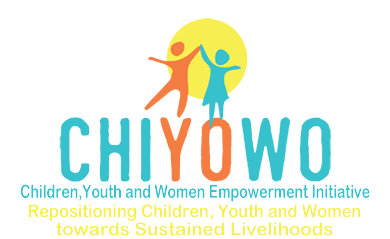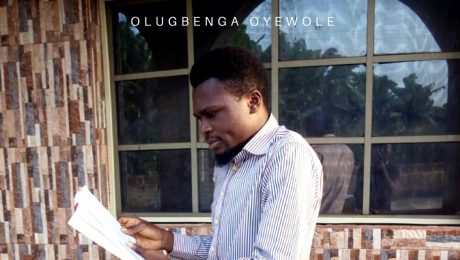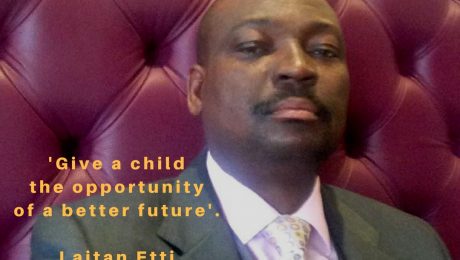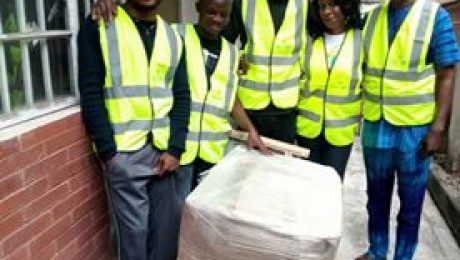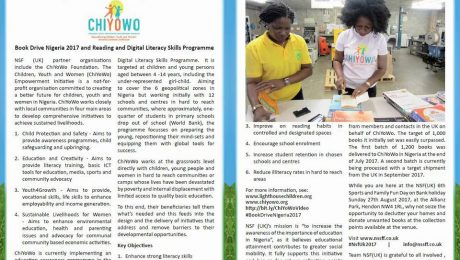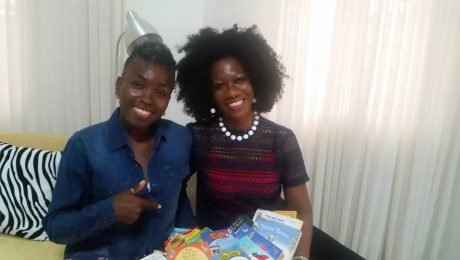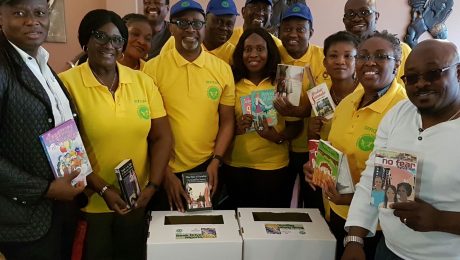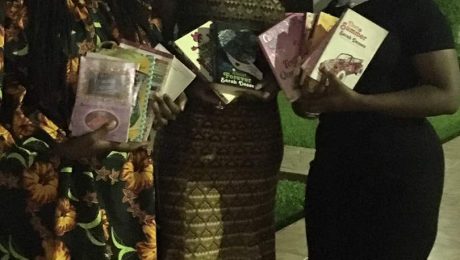Let’s recognise the way forward starts with #BookDriveNigeria2017
Olugbenga Oyewole firmly believes the power of achievement is evident from the green shoots of development.
ChiYoWo pledges to support over 12 schools in hard to reach communities in Nigeria by donating fiction, non-fiction and educational books from September 2017.
Let’s develop the next generation of leaders.
With much hope,
The ChiYoWo Family
#BookDriveNigeria2017 back to the grind…
Yes, Francis Ogunleye shares his thoughts.
That’s how he rolls and so do we.
Let’s all strive to Bring Back the Reading Culture in Nigeria especially amongst children ages 4-14 years.
Thank you very much.
The ChiYoWo Family
Join the #BookDriveNigeria2017 conversation…
Our #BookDriveNigeria2017 is rearing to go…
We the ChiYoWo Family invite you to spread the word using our #BookDriveNigeria2017. This ground breaking initiative is set to Bring Back the Reading Culture in Nigeria.
Watch this space 🙂
Books Donated in the United Kingdom Received in Nigeria
The Children, Youth and Women Empowerment Initiative (ChiYoWo) are proud to announce we have received a total of 6 boxes of books from our strategic partners – Nigerian Schools Foundation (UK) in the United Kingdom. The books were delivered at one of our sponsor’s office in Lagos, Nigeria. 3 of the big boxes are featured in our photograph.
We are indeed very grateful.
Much appreciated.
The ChiYoWo Family
Collaboration between Nigerian Schools Foundation (UK) and ChiYoWo Empowerment Initiative Fosters the Book Drive Initiative
Collaboration with strategic partners creates dynamic synergies. Welcome to our world #BookDriveNigeria2017 where Diasporans and Nigerians are indeed making a remarkable difference!
Two Great Nigerians in the Diaspora (United Kingdom) Donate 246 Books!
Dear Family, Friends, and Supporters,
Absolutely fantastic!
We just received 148 books from a famous Nigerian Author and 98 books from a renowned Nigerian Surgeon both residing in the United Kingdom.
Thank you so much for your donations you both took the exceptional step of making our dreams come true, despite the fact that you live outside London!
The books totaling 246 are a welcome addition to our growing collection.
Remember, we will be donating books all across schools in hard to reach communities in Nigeria from September 2017.
Please keep your book and financial donations rolling in…tell everyone :).
We love you for donating!
Much appreciated,
Toks and the ChiYoWo Team
A friend of ChiYoWo Empowerment Initiative Donates Books from her Reading Club Collection!
More books donated … Yippee!
We just mentioned the Book Drive Nigeria 2017 to Mrs. Olabode. She invited us over to her home selected and donated some books for our cause.
We are indeed grateful as the books came from her Reading Club Collection!
Much appreciated,
The ChiYoWo Family
1,191 Books Shipped from the United Kingdom NSF(UK) to ChiYoWo in Nigeria
Dear Family, Friends, and Supporters,
Great News!
We have received a total of 1,191 books in the United Kingdom (UK) and more are pouring :). The books are now Nigeria bound. Thank you so much to our anonymous shipper who shipped this first batch for FREE!!!
We have also received numerous pledges from more book donors in Nigeria. Watch this space…
Just to let you know, we have stamped all the books “Book Drive Nigeria 2017. NOT FOR SALE. Donated by CHIYOWO & NSF (UK). See some sample stamped pages attached.
This is one of the measures put in place to ensure donated books are not sold to third parties. There are other monitoring measures we will put in place, to make sure our beneficiaries (children aged 4-14 years) enjoy the maximum benefit of the Book Drive Nigeria 2017.
Once again thank you to all our donors (Financial and Book) and our supporters who are tirelessly spreading the word. Please keep your donations coming in.
Nothing is too small.
We love you for donating x.
Much appreciated,
Toks and the Team
Donated Books Surpass Initial Target of 1000 Books
Dear Family, Friends and Supporters,
Thank you so much for your donations received so far!
We are proud to say we have surpassed the initial book donation target of 1,000 books … we now have a total of 1,191 books :)! And guess what? Families are still donating more books.
Also, we’ve raised over £1000.00 within a month of our campaign … This is awesome!!! Thank you very much :).
But, we still need you to spread the word. Tell your families, friends, colleagues at work and more.
We need more money to enable us to reach our beneficiaries and deliver a heartfelt impactful project.
Every financial donation you make, less the Go Fund Me Fees of 7.9%, will go towards the ‘Book Drive Nigeria 2017’.
We are keeping records of all your donations and will give you a full report of how your money is spent and its impact on the beneficiaries.
We love you for donating.
Much appreciated,
Tokunbo and the Team
